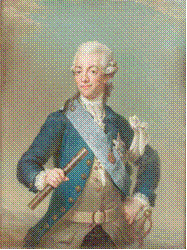

—Swedish ruler
—Read French Enlightenment works
—Reforms
—issued an ordinance providing for freedom of the press, he abolished torture, he supported complete religious freedom, he encouraged free trade and removed export tolls, he shored up the country’s weakened currency, and he even invented a national costume that became quite popular for a while.
—Absolutism
—grown weary of
battling with the Swedish Parliament
and the nobility
—eventually assassinated
